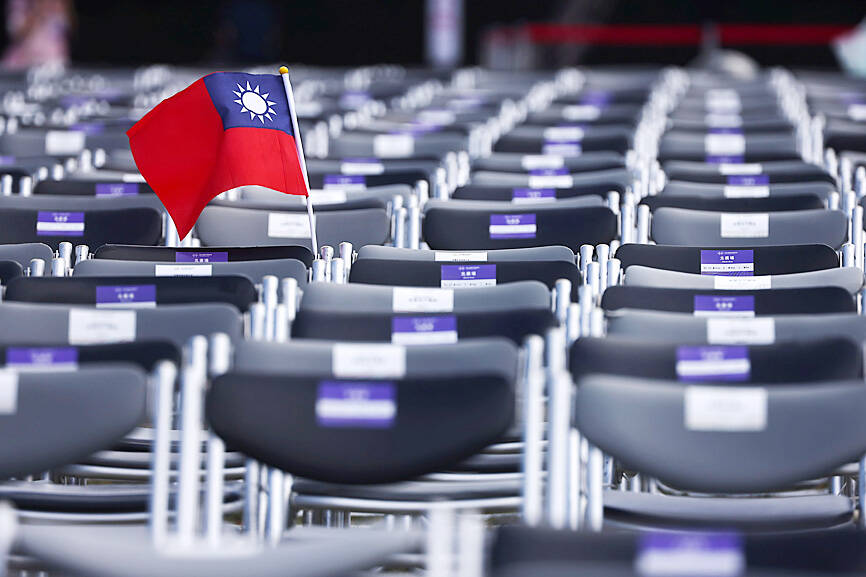The secretary-general of the World Medical Association (WMA), a confederation of more than 100 national medical associations, yesterday called on the WHO to end its continued exclusion of Taiwan.
During a keynote speech at this year’s NGO Leaders Forum in Taipei, WMA secretary-general Otmar Kloiber said his non-governmental organization (NGO) had long supported Taiwan’s inclusion in the WHO and participation in the World Health Assembly (WHA), the WHO’s annual decisionmaking meeting.
Due to its advocacy on Taiwan’s behalf, the WHO has threatened to revoke the WMA’s membership in the multilateral body, Kloiber said, adding that WMA observers with Taiwanese passports had been routinely denied entry to UN premises since 2017.

Photo: Ann Wang, Reuters
He said such “ridiculous” actions hurt not just the WMA, but also the WHO itself by forgoing the benefits of power, experience and humanitarian help from Taiwan.
“We see ourselves as advocates for healthcare everywhere, and the meaningful participation of knowledge is something which we believe is absolutely necessary to have complete inclusion,” Kloiber said. “And we hope that we can make a difference and get a reconsideration by the World Health Organization to have finally Taiwan included and participating in a very meaningful way.”
Taiwanese representatives were expelled from the WHO in 1972, one year after the People’s Republic of China was recognized as the sole representative of China by the UN.
During the administration of former Chinese Nationalist Party (KMT) president Ma Ying-jeou (馬英九) from 2009 to 2016, Taiwanese delegates, participating under the name Chinese Taipei, were granted observer status at the WHA.
Since then Taiwan has been excluded from the WHA due to opposition from China.
The NGO Leaders Forum was opened with remarks from Vice Minister of Foreign Affairs Alexander Yui, who said that it was the third consecutive year that the Ministry of Foreign Affairs had hosted an international forum to facilitate dialogue between the government and NGOs from Taiwan and abroad.
More than 600 participants from NGOs, government officials, business representatives and other guests had already taken part in this “meaningful event,” Yui said.
This year’s forum focused on the challenges and opportunities for a Taiwanese public-private partnership promoting peace and justice in global governance.

The Central Election Commission has amended election and recall regulations to require elected office candidates to provide proof that they have no Chinese citizenship, a Cabinet report said. The commission on Oct. 29 last year revised the Measures for the Permission of Family-based Residence, Long-term Residence and Settlement of People from the Mainland Area in the Taiwan Area (大陸地區人民在台灣地區依親居留長期居留或定居許可辦法), the Executive Yuan said in a report it submitted to the legislature for review. The revision requires Chinese citizens applying for permanent residency to submit notarial documents showing that they have lost their Chinese household record and have renounced — or have never

A magnitude 5.6 earthquake struck off the coast of Yilan County at 12:37pm today, with clear shaking felt across much of northern Taiwan. There were no immediate reports of damage. The epicenter of the quake was 16.9km east-southeast of Yilan County Hall offshore at a depth of 66.8km, Central Weather Administration (CWA) data showed. The maximum intensity registered at a 4 in Yilan County’s Nanao Township (南澳) on Taiwan’s seven-tier scale. Other parts of Yilan, as well as certain areas of Hualien County, Taipei, New Taipei City, Taoyuan, Hsinchu County, Taichung and Miaoli County, recorded intensities of 3. Residents of Yilan County and Taipei received

Taiwan has secured another breakthrough in fruit exports, with jujubes, dragon fruit and lychees approved for shipment to the EU, the Ministry of Agriculture said yesterday. The Animal and Plant Health Inspection Agency on Thursday received formal notification of the approval from the EU, the ministry said, adding that the decision was expected to expand Taiwanese fruit producers’ access to high-end European markets. Taiwan exported 126 tonnes of lychees last year, valued at US$1.48 million, with Japan accounting for 102 tonnes. Other export destinations included New Zealand, Hong Kong, the US and Australia, ministry data showed. Jujube exports totaled 103 tonnes, valued at

BIG SPENDERS: Foreign investors bought the most Taiwan equities since 2005, signaling confidence that an AI boom would continue to benefit chipmakers Taiwan Semiconductor Manufacturing Co’s (TSMC, 台積電) market capitalization swelled to US$2 trillion for the first time following a 4.25 percent rally in its American depositary receipts (ADR) overnight, putting the world’s biggest contract chipmaker sixth on the list of the world’s biggest companies by market capitalization, just behind Amazon.com Inc. The site CompaniesMarketcap.com ranked TSMC ahead of Saudi Aramco and Meta Platforms Inc. The Taiwanese company’s ADRs on Tuesday surged to US$385.75 on the New York Stock Exchange, as strong demand for artificial intelligence (AI) applications led to chip supply constraints and boost revenue growth to record-breaking levels. Each TSMC ADR represents